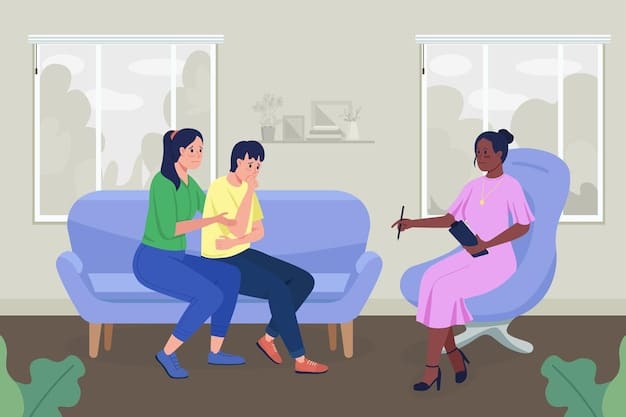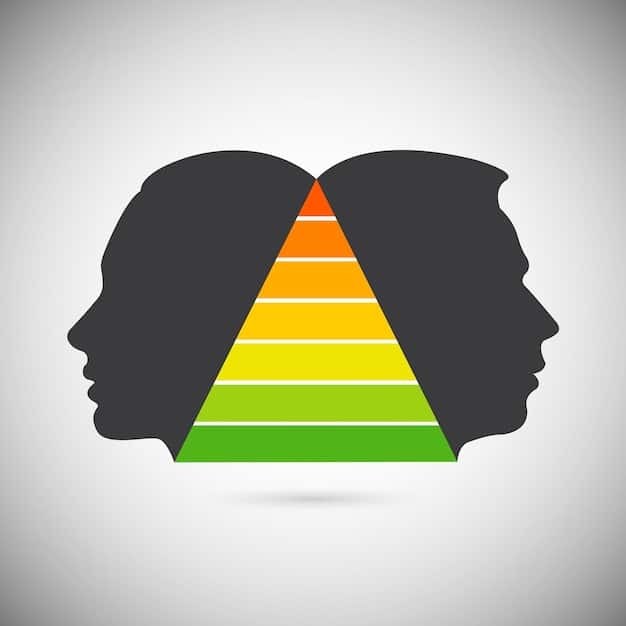Improve Mental Health: CBT in 12 Weeks

Cognitive Behavioral Therapy (CBT) can significantly improve mental health in 12 weeks by helping individuals identify and change negative thought patterns and behaviors. CBT focuses on developing coping strategies to manage various mental health conditions, fostering healthier responses to challenges and promoting overall well-being.
Are you seeking ways to improve your mental health? Cognitive Behavioral Therapy (CBT) Can Improve Your Mental Health in 12 Weeks. It is a structured, short-term approach that can help you manage your thoughts, feelings, and behaviors, leading to significant improvements in your overall well-being. Discover how CBT can empower you to take control and live a more fulfilling life.
Understanding Cognitive Behavioral Therapy (CBT)
Cognitive Behavioral Therapy (CBT) is a popular and effective form of psychotherapy. It is based on the idea that our thoughts, feelings, and behaviors are interconnected. By changing negative thought patterns and behaviors, individuals can improve their emotional state and overall functioning.
CBT is a practical and goal-oriented therapy that focuses on addressing current problems and developing coping strategies. It is widely used to treat a variety of mental health conditions.

The Core Principles of CBT
CBT operates on several key principles that distinguish it from other forms of therapy. These principles provide a structured framework for understanding and addressing mental health challenges.
- Identifying Negative Thought Patterns: CBT helps individuals recognize and challenge negative thought patterns that contribute to emotional distress.
- Behavioral Activation: This involves increasing engagement in activities that are enjoyable and meaningful, which can improve mood and reduce symptoms of depression.
- Cognitive Restructuring: With the help of therapist Cognitive Restructuring enables individuals transform negative thoughts into more balanced and realistic ones.
- Problem-Solving Skills: CBT equips individuals with problem-solving skills to effectively manage challenges.
By understanding and applying these principles, individuals can make significant progress in improving their mental health and overall well-being. It is a collaborative process between the therapist and the individual, with a focus on achieving specific goals.
In conclusion, CBT offers a structured and effective approach to address the root causes of mental health issues by reshaping negative thought patterns and behaviors.
Conditions CBT Can Effectively Treat
CBT is a versatile therapy and has proven effective in treating a wide range of mental health conditions. Its structured approach and focus on practical skills make it a valuable tool for managing various challenges.
Here are some of the conditions that CBT can effectively treat:
Anxiety Disorders
CBT is a first-line treatment for anxiety disorders such as generalized anxiety disorder (GAD), panic disorder, social anxiety disorder, and phobias. It helps individuals identify and challenge anxiety-provoking thoughts and develop coping strategies to manage their symptoms.
Depression
CBT can be highly effective in treating depression by helping individuals identify and change negative thought patterns. It also encourages behavioral activation, which involves increasing engagement in activities that are enjoyable and meaningful.

Obsessive-Compulsive Disorder (OCD)
Exposure and Response Prevention (ERP), a specific type of CBT, is considered the gold standard treatment for OCD. It involves exposing individuals to their obsessions and preventing them from engaging in compulsive behaviors. Over time, this helps reduce anxiety and the urge to perform compulsions.
CBT is not limited to these specific conditions. It can also be adapted to address other mental health issues, such as post-traumatic stress disorder (PTSD), eating disorders, and substance use disorders. These conditions vary from PTSD where an individual experiences flashbacks of the past to severe eating disorders that can ultimately threaten the individual’s life.
In summary, CBT is effective for anxiety, depression, OCD, and other mental health conditions. Through cognitive restructuring, exposure techniques, and skills training, CBT addresses negative patterns.
What to Expect During a 12-Week CBT Program
A 12-week CBT program typically involves a structured series of sessions with a trained therapist. Each session builds upon the previous one, providing a comprehensive approach to addressing mental health challenges.
Here’s what you can generally expect during a CBT program:
Initial Assessment and Goal Setting
The initial sessions will focus on assessing your mental health needs and setting specific, measurable, achievable, relevant, and time-bound (SMART) goals. Your therapist will gather information about your current symptoms, past experiences, and personal history.
Learning CBT Techniques
Throughout the program, you will learn various CBT techniques, such as identifying negative thought patterns, challenging cognitive distortions, and developing coping strategies. You will practice these techniques both in session and through homework assignments.
- Thought Records: Keeping track of your thoughts, feelings, and behaviors in specific situations.
- Behavioral Experiments: Testing the validity of your negative thoughts and beliefs through real-life experiments.
- Relaxation Techniques: Learning relaxation techniques such as deep breathing, progressive muscle relaxation, and mindfulness meditation.
As you progress through the program, you will gradually gain more confidence in your ability to manage your thoughts, feelings, and behaviors. The therapist will provide ongoing support and feedback to help you stay on track and achieve your goals.
In conclusion, a 12-week CBT program offers a structured path to understanding and addressing mental health challenges. The initial phase involves assessments and goals setting, while the subsequent phase dives into CBT techniques.
Benefits of CBT After 12 Weeks
After 12 weeks of CBT, individuals typically experience a range of improvements in their mental health and overall well-being. These benefits can be significant and life-changing.
These are some of the key benefits you can expect:
Reduced Symptoms of Anxiety and Depression
CBT can lead to a significant reduction in the symptoms of anxiety and depression. By challenging negative thoughts and developing coping strategies, individuals can experience a greater sense of calm and emotional stability.
Improved Coping Skills
CBT equips individuals with practical coping skills to manage stress, anxiety, and other challenges. These skills can be used in various areas of life, leading to improved resilience and adaptability.
By challenging negative thoughts and beliefs, individuals can develop a more balanced and realistic perspective on their thoughts and feelings. This can lead to improved self-esteem, confidence, and overall life satisfaction.
- Better Relationships: Improved communication and conflict-resolution skills can lead to healthier and more fulfilling relationships.
- Increased Productivity: Enhanced focus, motivation, and time-management skills can lead to improved performance at work or school.
- Greater Overall Well-being: A combination of reduced symptoms, improved coping skills, and enhanced self-awareness can contribute to a greater sense of overall well-being and life satisfaction.
In summary, after 12 weeks, CBT leads to reduced anxiety and depression, improved coping skills, greater self-awareness, and overall well-being.
Finding a Qualified CBT Therapist
Finding a qualified CBT therapist is essential for receiving effective treatment. A skilled therapist can provide the guidance and support you need to achieve your mental health goals.
Here are some steps to help you find a qualified CBT therapist:
Check Credentials and Experience
Ensure that the therapist is licensed and has specific training and experience in CBT. Look for credentials such as Licensed Psychologist (LP), Licensed Clinical Social Worker (LCSW), or Licensed Professional Counselor (LPC).
Seek Recommendations
Ask your primary care physician, friends, or family members for recommendations. Personal referrals can be a valuable way to find a therapist who is a good fit for you.
Many professional organizations offer online directories of licensed therapists who specialize in CBT. These directories often include information about the therapist’s credentials, experience, and areas of expertise. They often allow you to check whether or not the therapist you are about to choose is licensed.
- Initial Consultation: Schedule an initial consultation with a few therapists to see if there is a good fit.
- Therapeutic Relationship: A strong therapeutic relationship is essential for successful therapy.
In summary, finding a therapist involves verifying credentials and experience, seeking recommendations, and scheduling an initial consultation.
Integrating CBT Techniques Into Daily Life
To maximize the benefits of CBT, it’s important to integrate the techniques you learn into your daily life. Consistent practice will help you maintain and build upon the progress you’ve made during therapy.
Here are some ways to effectively integrate CBT techniques into your daily routine:
Practice Thought Records Regularly
Take time each day to practice using thought records to identify and challenge negative thought patterns. This can help you become more aware of your thoughts and develop more balanced and realistic perspectives.
Use Behavioral Activation Strategies
Incorporate behavioral activation strategies into your daily routine by scheduling activities that are enjoyable and meaningful. Even small activities can make a big difference in your mood and overall well-being.
- Mindfulness Meditation: Engage in mindfulness meditation to increase awareness of your thoughts, feelings, and sensations in the present moment.
- Problem-Solving Skills: Apply problem-solving skills to effectively manage challenges and make informed decisions.
By consistently practicing these techniques, you can strengthen your ability to manage your thoughts, feelings, and behaviors, leading to lasting improvements in your mental health and overall well-being.
In summary, integrating CBT techniques involves regular practice of thought records, behavioral activation, mindfulness meditation, and problem-solving skills.
| Key Point | Brief Description |
|---|---|
| 🧠 Cognitive Restructuring | Transforming negative thoughts into more balanced and realistic ones. |
| 📅 12-Week Program Benefits | Reduction in anxiety, improved coping skills, and enhanced self-awareness. |
| 🧰 Daily CBT Techniques | Practicing thought records, behavioral activation, and mindfulness. |
| 🛡️ Conditions Treated | Effective for anxiety, depression, OCD, and PTSD. |
Frequently Asked Questions (FAQ)
▼
The main goal of CBT is to help individuals identify and change negative or unhelpful thought patterns and behaviors. It focuses on developing practical coping strategies to improve overall mental health and well-being.
▼
A typical CBT session usually lasts between 45 to 60 minutes. The duration can vary depending on the therapist and the specific needs of the individual or the type of therapy applied.
▼
Yes, CBT is often adapted to suit different age groups, including children and teenagers. Therapists use age-appropriate techniques to help younger individuals understand and manage their emotions and behaviors effectively.
▼
Start by asking your primary care physician for referrals. Also, consult online directories of licensed therapists who specialize in CBT and ensure they have the appropriate credentials and experience.
▼
In your first CBT session, you can expect the therapist to gather information about your current symptoms, past experiences, and personal history. They will also discuss your goals for therapy and explain the CBT process.
Conclusion
Cognitive Behavioral Therapy (CBT) offers a structured and effective path to improve your mental health within 12 weeks. By understanding its principles, practicing techniques, and integrating them into daily life, you can achieve lasting positive changes. Finding a qualified therapist and committing to the process are key to experiencing the full benefits of CBT.





